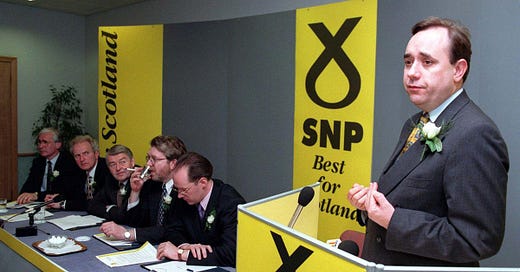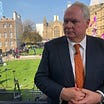Alex Salmond: a bathetic end for the man who nearly broke the union
Ironically, the Nationalist was happier operating at Westminster.
Alex Salmond died suddenly this weekend at the age of sixty-nine, short of his three score years and ten, and short of the life expectancy of a man of his vintage.
He was a politician who led his life, both professional and personal, at pace and with gusto, delighting in arguing his case fiercely, sometimes to the point of bullying.
He joined the then marginal Scottish National Party at St Andrews University in 1973 aged 18. He first became an MP, for Banff and Buchan, in 1987 aged 32. Party leader for the first time in 1990. Inaugural member of the new Scottish parliament in 1999. First Minister of Scotland from 2007 until the 55.4% to 44.7% defeat for Scottish independence in the 2014 referendum. It was both the apex and end of his front-rank career. He resigned his high office immediately handing over to his then protégé Nicola Sturgeon. Salmond was still only 59.
Alex Salmond might then have rested on his laurels but he did not know how to stop. Perhaps this was out of vanity or perhaps he could not abandon his commitment to independence believing that “for Scotland, the campaign continues and the dream shall never die.” Either way, the final decade of his life tarnished the reputation of one of the most successful politicians of his generation, as the man who turned Scottish nationalism into a major political movement.
Hours before his fatal heart attack, Salmond was still fighting. In a Twitter thread last Saturday, he attacked the SNP first minister, John Swinney, for attending the Labour government’s new Council of the Nations and Regions. “It is designed to diminish the status of our Parliament and the First Minister”, he typed on X, “Part of becoming independent is about thinking independently, not subserviently”.
Ironically, Salmond himself was happier operating as a prominent and divisive figure on the UK-wide stage at Westminster than he was in Holyrood. The green benches facing each other at two swords length in the Commons were more to his taste than the designer hemisphere in Edinburgh. As a young MP, he was suspended for a week after disrupting Nigel Lawson’s Budget. I remember him relishing a Scottish journalists’ sketch describing how a debate left “blood and snotters” on the floor (only metaphorically of course).
Salmond gave up being an MSP to stand successfully to be a Westminster MP in 2015 – much to the annoyance of Sturgeon. Describing himself as “a bogeyman”, he was elected for Gordon but lost the seat two years later in 2017 to Boris Johnson’s Conservatives.
Soon afterwards, Salmond was engulfed in #MeToo allegations of sexual misconduct and resigned from the SNP to clear his name.
In March 2020, Salmond went on trial charged with fourteen criminal offences against nine women including two counts of attempted rape, nine of sexual assault, two of indecent assault, and one of breach of the peace. He pleaded Not Guilty. One charge was dropped. The jury acquitted him all 13 remaining charges. He was found “not guilty” on 12 of them. One charge of “sexual assault with intent to rape” met the Scottish verdict of “not proven”. In court, his QC Gordon Jackson, a former Labour MP, said it was a pity his client had not been “a nicer and better man”. Jackson was also caught on video on a train saying “I think he was a nasty person to work for… a nightmare to work for". Salmond wished he had been “more careful with people’s personal space.”
Salmond’s wife Moira survives him. They married in 1981. She is seventeen years his senior and was his one-time boss in the Scottish Office. Moira and Alex were always a loving and polite couple, even when encountered, as I once did, at 3am in their nightclothes in an Edinburgh hotel lobby during a fire alarm.
Civil servants, a government official and an SNP politician were among the unidentified women making the sexual misconduct allegations. Salmond said: “Some, not all, are fabrications – deliberate fabrications for a political purpose”. They emerged as the formerly close partnership between Sturgeon and Salmond deteriorated into a vicious feud fought out in legal cases and parliamentary inquiries in which Salmond showed his mastery of legal procedures. At the time of his death, Salmond was suing the Scottish Government for £3 million in damages.
Salmond formed a new nationalist party, Alba, for the 2022 Holyrood election. He accused Nicola Sturgeon and the SNP of having advanced the independence cause “not one jot” since 2014. His name was at the top of his party’s list in the proportional representation election but none of Alba’s 111 candidates were elected. Alba does have one MSP in Ash Regan, who defected from the SNP but it is yet to be elected to a parliament. It lost all 19 of its deposits with less than 5% of votes cast in this year’s general election. This was a far cry from 2011, when Salmon led the SNP to an unprecedented majority in the Scottish Parliament, whose voting system was designed to make that near impossible.
Salmond’s genius was to turn the SNP into a party of government in Scotland, effectively replacing Labour on the centre-left in Scotland – until this year. He did this by broadening its appeal from its traditional presbyterian heartland in the North East, into a party for all, including the “central belt” and the many working class Catholics to the West around Glasgow. As First Minister, he rebranded whatever he could as a national institution, such as “Police Scotland” and the “Scottish Government”, and he contrasted the will of the Scottish people against Labour and Conservative governments in London.
As an economist and racing tipster, Salmond talked a good game about “the arc of prosperity” which an independent Scotland could join with Scandinavian countries, all in the European Union. But when the Indyref came, he struggled to explain how an independent Scotland could be economically viable or even what currency it would have. Salmond eventually claimed that the pound was as much Scotland’s as the Bank of England’s.
Brexit, which Salmond opposed, made the prospect of a rift with the rest of the UK even more severe. Salmond got tetchy in the last extended interview I did with him before the last Holyrood election, when asked about the land border there would have to be if Scotland was in the EU and England out of it.
I have seen Alex socially since then. He remained kind and approachable but each time he was more dogmatic and less interested in hearing what anyone else had to say.
Alex did not look after his health. He had a bathetic end: a heart attack at a b-list conference in North Macedonia, while trying to open a ketchup bottle for Tasmina Ahmed-Sheikh, his colleague, former SNP MP and producer on his ill-judged shows for Russia Today and the Edinburgh Fringe.
But once, he was the man who nearly broke the United Kingdom by turning his dream of an independent Scotland into reality.






